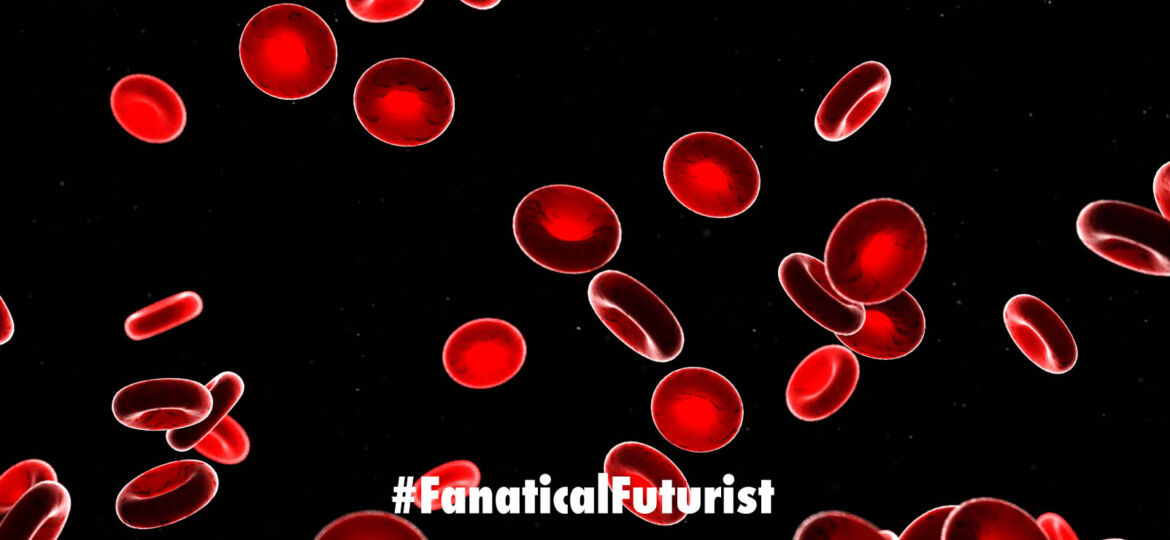
WHY THIS MATTERS IN BRIEF
Blood is often a scarce commodity, and very precious, but now it looks like we can grow it in a lab rather than having to always rely on donors.
 Love the Exponential Future? Join our XPotential Community, future proof yourself with courses from XPotential University, read about exponential tech and trends, connect, watch a keynote, or browse my blog.
Love the Exponential Future? Join our XPotential Community, future proof yourself with courses from XPotential University, read about exponential tech and trends, connect, watch a keynote, or browse my blog.
Human organs used to be grown in, well, you know, humans … but now they’re 3D printed, like this heart and this other bunch of stuff, brains are grown in jars and stomachs in petri dishes. And that’s just the beginning. Now, in another major medical breakthrough, and years after the US Military said it was going to try to create powdered human blood, laboratory grown red blood cells have been transfused into volunteers in a world first clinical trial that could help revolutionise treatments for patients with sickle cell disease and thalassemia.
The manufactured blood cells were grown from stem cells from donors, which in future could allow donor blood to be expanded into much larger volumes for transfusion. The trial is studying the lifespan of the lab grown cells compared with infusions of standard red blood cells from the same donor.
The Future of Healthcare and Work, by Keynote Speaker Matthew Griffin
“This challenging and exciting trial is a huge stepping stone for manufacturing blood from stem cells,” said Prof Ashley Toye, of the University of Bristol and an investigator on the trial. “This is the first time lab grown blood from [from donor stem cells] has been transfused and we are excited to see how well the cells perform at the end of the clinical trial.”
Two healthy volunteers have so far been transfused with the lab grown red cells, as part of the Restore trial, led jointly by NHS Blood and Transplant and the University of Bristol. No negative side-effects have been reported.
There are two potential near-term advantages of using lab-grown blood. First, the approach could address the donor shortage for those with rare blood types who require regular transfusions, such as patients with sickle cell disease and thalassemia.
Secondly, the lab-grown blood is expected to outperform standard donor blood. Red blood cells have a lifespan of about 120 days and a normal blood donation will contain cells of varying ages. By contrast, the lab-grown blood cells are all fresh, so should perform better and last longer. This could reduce the frequency of transfusions for patients who regularly need blood and help avoid iron overload, a complication linked to repeated transfusions where too much iron accumulates in the body and has to be removed.
“We hope our lab grown red blood cells will last longer than those that come from blood donors,” said Prof Cedric Ghevaert, chief investigator based at the University of Cambridge. “If our trial, the first such in the world, is successful, it will mean that patients who currently require regular long-term blood transfusions will need fewer transfusions in future, helping transform their care.”
People with blood disorders such as thalassemia or sickle cell disease are dependent on regular transfusions of blood or red cell exchanges – some people require up to 12 units of blood every four to six weeks. There is also a shortage of donors from black and minority ethnic communities who can provide the best ethnically matched blood for the growing number of patients with blood disorders, some of which are also more prevalent in these groups.
The lab grown blood is manufactured from adult stem cells taken from donor blood. The stem cells are placed in a nutrient solution for 18-21 days, which encourages the cells to multiply and develop into more mature cells. About 24 litres of nutrient solution is needed to produce one to two tablespoons of red blood cells.
The cells are labelled with a tracer that allows them to be detected in blood samples from the trial participants in the six months after the initial injection of cells.
At least 10 participants are expected receive two mini transfusions at least four months apart, one of standard donated red cells and one of lab grown red cells, to find out if the young red blood cells made in the laboratory last longer than cells made in the body.
Prof Marc Turner, director of the Scottish National Blood Transfusion Service, who is not involved in the trial, described it as “a really important step along the way” towards the ambition of manufacturing blood in the lab for wider clinical use. “That’s a reasonable vision in the long term,” he said, but added that blood donors would remain essential for the foreseeable future.
















